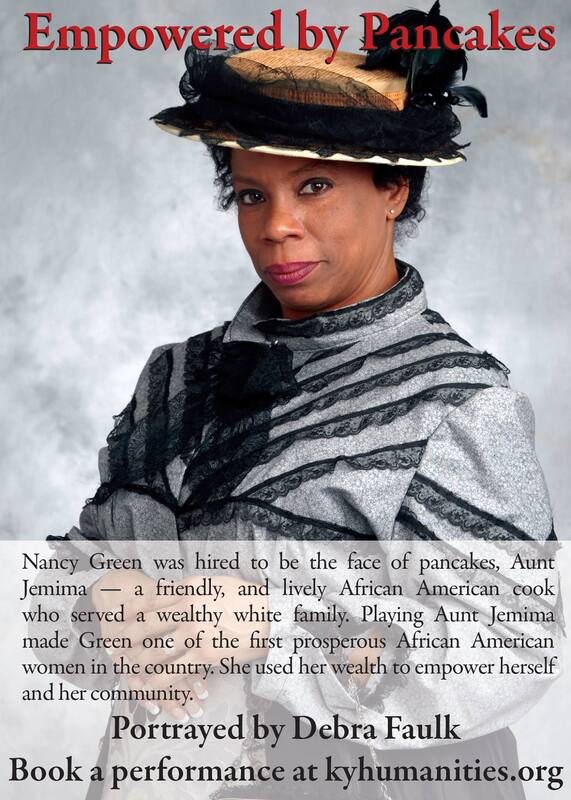DD RAINBOW portrays NANCY GREEN in "Being Aunt Jemima - The Pancake Queen" (1834-1923)
Script Written by: BO LIST Costume by: ROBERT HAVEN Performed by: DEBRA F. FAULK
NANCY GREEN became one of the first prosperous African American women in the U.S. Green was born enslaved in Montgomery County, Kentucky, in 1834. While in Kentucky she worked for the Walker family and moved with them to Chicago just after the Great Fire, in 1872. Eight years later, Nancy Green became "Aunt Jemima." Businessman R.T. Davis had purchased a pre-mixed, self-rising recipe for pancakes and wanted an "Aunt Jemima," a character from minstrel shows which were popular at the time, to be the face of his pancakes. "Aunt Jemima" would be a friendly, animated, African American cook who served a wealthy white family. Playing the role of "Aunt Jemima" gave Green financial independence few African Americans and few women experienced at the time. She used her wealth as a means to empower her community. She was particularly active in her church, leading missionary trips, investing in anti-poverty programs for African Americans, and advocating for equal rights. Though her work depended on a derogatory racial stereotype, her financial success demonstrates how black Americans could sometimes play on and use such images to their advantage.
Script Written by: BO LIST Costume by: ROBERT HAVEN Performed by: DEBRA F. FAULK
NANCY GREEN became one of the first prosperous African American women in the U.S. Green was born enslaved in Montgomery County, Kentucky, in 1834. While in Kentucky she worked for the Walker family and moved with them to Chicago just after the Great Fire, in 1872. Eight years later, Nancy Green became "Aunt Jemima." Businessman R.T. Davis had purchased a pre-mixed, self-rising recipe for pancakes and wanted an "Aunt Jemima," a character from minstrel shows which were popular at the time, to be the face of his pancakes. "Aunt Jemima" would be a friendly, animated, African American cook who served a wealthy white family. Playing the role of "Aunt Jemima" gave Green financial independence few African Americans and few women experienced at the time. She used her wealth as a means to empower her community. She was particularly active in her church, leading missionary trips, investing in anti-poverty programs for African Americans, and advocating for equal rights. Though her work depended on a derogatory racial stereotype, her financial success demonstrates how black Americans could sometimes play on and use such images to their advantage.

